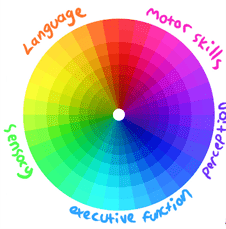By Caroline O’Hare (she/her), Business Communications & Marketing
This week marks Neurodiversity Celebration Week; an initiative created to challenge the stereotypes and misconceptions that exist when it comes to understanding people with neurological differences. It raises awareness of the neurodiversity all around us but how some of it is hidden. It highlights the need for us to move away from stigma and stereotypes towards a more diverse and inclusive culture which can better understand, value and celebrate the talents of neurodivergent people. This year’s theme is celebrating different minds.
Definitions are only a start
To celebrate and appreciate neurodiversity it helps to understand it. Defining terms often marks the first step in this path. Neurodiversity describes the natural diversity of the human brain in terms of cognitive function and behaviours across the population. It can be expressed through the different skills, abilities and needs. Neurodivergence describes cognitive function and behaviours which diverge from the ‘typical’. It often serves as an umbrella term covering many neurological differences such as attention deficit (ADD, ADHD), autism, dyslexia, dyspraxia and Tourette’s. To be neurodivergent is to behave, think or learn differently compared to those considered neurotypical.
Improving understanding on neurodivergence
While definitions can be helpful as a way into trying to understand neurodivergence, what is becoming clear is that people experience it very differently individually. This has been best exemplified in naturalist and broadcaster Chris Packham’s recent BBC series Inside Our Autistic Minds. A pioneer in forging a greater understanding of neurodiversity and divergence, Chris has spoken not only about his own experiences as someone with Asperger’s syndrome but has also given a powerful platform to other neurodivergent people to communicate their own experiences of living in a neurotypical world.
Changes in thinking about thinking differently
Approaches to understanding neurodivergence like these have revealed several things. Firstly, no two neurodivergent people are the same, even if they seem to have the same diagnosis. For example, experiences of autism can vary dramatically and indeed are challenging our understanding and definitions. Current thinking has moved away from viewing autism as linear spectrum to seeing it as more of a spectral wheel, where each person with autism has a different set of traits from within it. Such differences in how neurodivergence is experienced and expressed make it difficult to diagnose. Consequently, it can take many years to be identified more formally and it is becoming increasingly common for people to be diagnosed later in life.
Past thinking

Present thinking

Secondly, neurodivergence can be hard to spot as many people learn to mask certain behaviours. Again, thinking has changed here, and it is now increasing recognised that women as well as men may be affected by autism but are perhaps more adept at masking in social situations. Such shifts in thinking about neurodivergence are now increasingly evident in schools, where attention deficit (ADD, ADHD), dyslexia, dyspraxia and forms of autism like Aspergers syndrome are more commonly identified and supported early through special educational needs (SEN) initiatives. This means that more people than ever are coming into the workplace who already have identified needs that may require reasonable adjustment in some way. So, what does this mean for employers?
Neurodivergence in the STEM Workplace
In general, employers are in the process of catching up. At Exploristics, we celebrate different minds and value thinking outside the box. It is an essential part of who we are and what we do. Therefore, we are embracing our neurodiverse talent and seeking to support it more practically using several strategies. We are implementing workshops and training to raise awareness and improve understanding. We are supportive of those seeking screening and are happy to signpost providers. We also provide reasonable adjustments and tools for those who need them. In short, we are seeking to empower all our team members to do what they do best; think differently.
Further resources:




